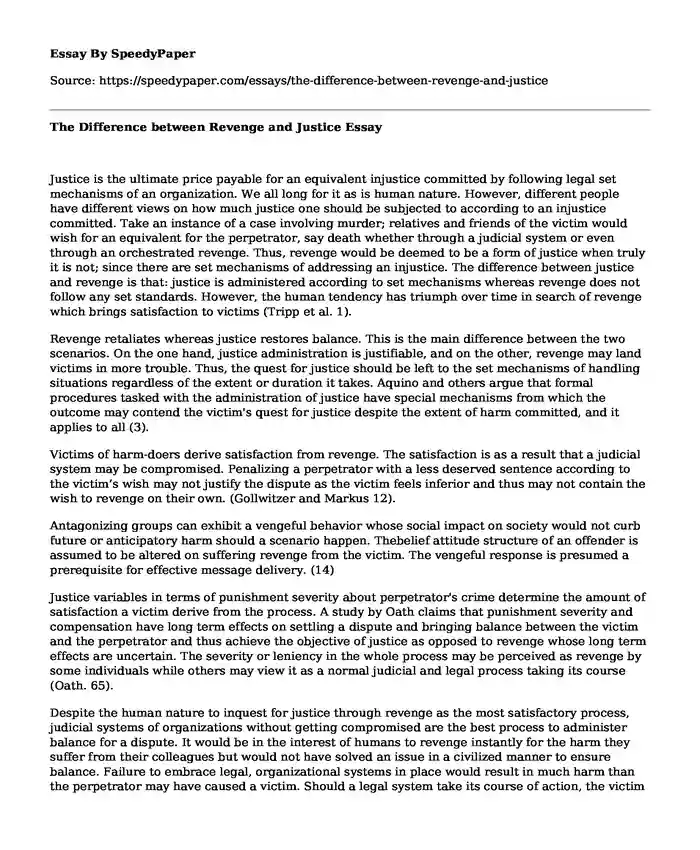
| Type of paper: | Essay |
| Categories: | Company Management Psychology United States Law |
| Pages: | 3 |
| Wordcount: | 697 words |
Justice is the ultimate price payable for an equivalent injustice committed by following legal set mechanisms of an organization. We all long for it as is human nature. However, different people have different views on how much justice one should be subjected to according to an injustice committed. Take an instance of a case involving murder; relatives and friends of the victim would wish for an equivalent for the perpetrator, say death whether through a judicial system or even through an orchestrated revenge. Thus, revenge would be deemed to be a form of justice when truly it is not; since there are set mechanisms of addressing an injustice. The difference between justice and revenge is that: justice is administered according to set mechanisms whereas revenge does not follow any set standards. However, the human tendency has triumph over time in search of revenge which brings satisfaction to victims (Tripp et al. 1).
Revenge retaliates whereas justice restores balance. This is the main difference between the two scenarios. On the one hand, justice administration is justifiable, and on the other, revenge may land victims in more trouble. Thus, the quest for justice should be left to the set mechanisms of handling situations regardless of the extent or duration it takes. Aquino and others argue that formal procedures tasked with the administration of justice have special mechanisms from which the outcome may contend the victim's quest for justice despite the extent of harm committed, and it applies to all (3).
Victims of harm-doers derive satisfaction from revenge. The satisfaction is as a result that a judicial system may be compromised. Penalizing a perpetrator with a less deserved sentence according to the victim's wish may not justify the dispute as the victim feels inferior and thus may not contain the wish to revenge on their own. (Gollwitzer and Markus 12).
Antagonizing groups can exhibit a vengeful behavior whose social impact on society would not curb future or anticipatory harm should a scenario happen. Thebelief attitude structure of an offender is assumed to be altered on suffering revenge from the victim. The vengeful response is presumed a prerequisite for effective message delivery. (14)
Justice variables in terms of punishment severity about perpetrator's crime determine the amount of satisfaction a victim derive from the process. A study by Oath claims that punishment severity and compensation have long term effects on settling a dispute and bringing balance between the victim and the perpetrator and thus achieve the objective of justice as opposed to revenge whose long term effects are uncertain. The severity or leniency in the whole process may be perceived as revenge by some individuals while others may view it as a normal judicial and legal process taking its course (Oath. 65).
Despite the human nature to inquest for justice through revenge as the most satisfactory process, judicial systems of organizations without getting compromised are the best process to administer balance for a dispute. It would be in the interest of humans to revenge instantly for the harm they suffer from their colleagues but would not have solved an issue in a civilized manner to ensure balance. Failure to embrace legal, organizational systems in place would result in much harm than the perpetrator may have caused a victim. Should a legal system take its course of action, the victim may suffer double consequences; for revenging and the perpetrator's harm. It's recommended to follow legal methods to achieve justice rather than revenge and cause more damage (Hershcovis 235).
Works Cited
Aquino, Karl, Thomas M. Tripp, and Robert J. Bies. "Getting even or moving on? Power, procedural justice, and types of offense as predictors of revenge, forgiveness, reconciliation, and avoidance in organizations." Journal of applied psychology91.3 (2006): 653.
Gollwitzer, Mario, and Markus Denzler. "What makes revenge sweet: Seeing the offender suffer or delivering a message?."Journal of Experimental Social Psychology 45.4 (2009): 840-844.
Hershcovis, M. Sandy, et al. "Predicting workplace aggression: a meta-analysis." Journal of applied Psychology92.1 (2007): 228.
Orth, Ulrich. "Does perpetrator punishment satisfy victims' feelings of revenge?." Aggressive Behavior: Official Journal of the International Society for Research on Aggression 30.1 (2004): 62-70
Tripp, Thomas M., Robert J. Bies, and Karl Aquino. "Poetic justice or petty jealousy? The aesthetics of revenge."Organizational behavior and human decision processes 89.1 (2002): 966-984.
Cite this page
The Difference between Revenge and Justice. (2022, Dec 09). Retrieved from https://speedypaper.net/essays/the-difference-between-revenge-and-justice
Request Removal
If you are the original author of this essay and no longer wish to have it published on the SpeedyPaper website, please click below to request its removal:
- User Interface Analysis in Our Free Essay for Everyone
- Healthcare Essay Example: Current Event Analysis
- Business Essay Sample on Deutsche Lufthansa AG
- Economics Essay Example on the City of Merced
- Free Essay Example: Right to Die, Death With Dignity Statutes
- Paper Example: Trade and Absolute. Comparative Advantages
- Civil Disorder During Corona Virus Pandemic - Free Essay
Popular categories




